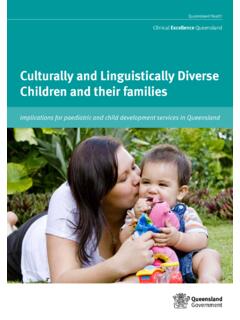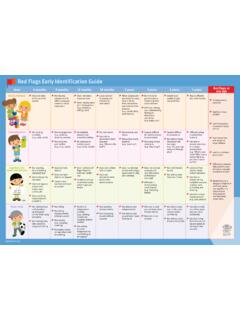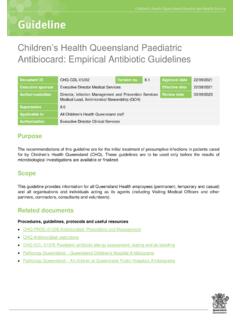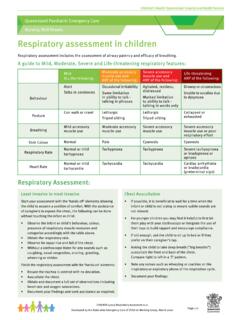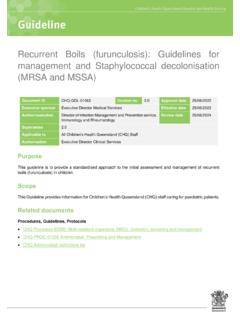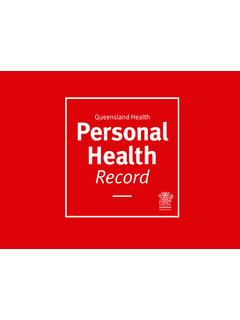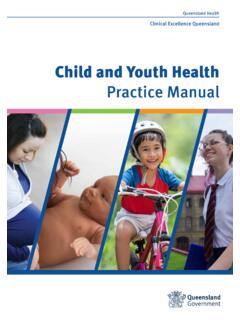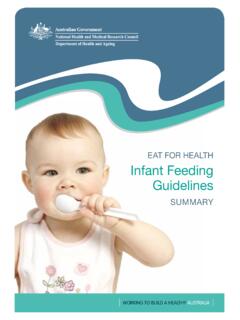Transcription of Your guide to the first 12 months - Child Health Information
1 Alc ohol and Drug Information Servic e1800 177 833 (free cal l) .g Breastf eeding Association1800 686 268 (free cal l) eeding Information (Queensland Health ) .g eedingBeyond Blue Healthy F amilies 1300 22 4636 healthyf ldren s Health Queensland hi .g ld Safety After Hours Servic e Centre1800 177 135 (free cal l) / 07 3235 9999 (Brisbane)DV Connect (domestic vio lence hotline) Women: 1800 811 811 (24hr, 7 days) Men: 1800 600 636 (9 midnight, 7 days) El len Barron Family Centre (p ar enting support servic e by r ef erral only) 07 3139 hi .g -c entreAustralian Immuni sation Register 1800 653 809 (free cal l) es/medicare/australian-immuni sation-registerImmuni sation Information (Queensland Health ) e Queensland07 3854 1829 id saf eqld .c Consult ants of Australi a and New Zealand02 9431 8621 (24-hour hotline) 13 11 14 (free cal l) (Perinat al Anxiety & Depression Association) 1300 726 306 (helpline) Poi sons Information Centre (24-hour hotline) 13 11 26 hi.
2 G es/queensland-poisons- Information -centre Queensland Centre for Perinat al and Infant Mental hi .g es/mental- Health -servic es/qcpimhQuit HQ (smoking cessation)Quitline: 13 78 48 sing Chi ldren Network aisingchi Nose (SID S and Kids) (24-hour support line) 1300 308 307 (Rel ationship and Reproductive Health )07 3250 0200 (lists local c linics)Women s Health Queensland1800 017 676 (free cal l) / 07 3216 0376 (Brisbane) Health (24 hour Health hotline including Child Health ) 13 43 25 84 *and ask for the Child Health .g :of the phone number (13 43 25).Useful contacts and websites6/2021IN AN EMERGENCY, ALWAYS CALL 000 AND ASK FOR THE AMBULANCE, POLICE, OR FIRE ldrenshealthqldNational Immuni sation Information Line 1800 671 811 (free cal l) MensLine Australia1300 789 978 Health InformationYour guide to the first 12 monthsChildren s Health Queensland Hospital and Health ServiceTo access this booklet online, go to.
3 2 Bonding ..4 Keeping your baby safe ..5 Safety advice for you and your baby ..5 Safe sleeping ..10 Immunisation ..13 How your baby develops ..140 3 months ..153 6 months ..186 9 12 months ..27 Taking care of your baby s teeth ..32 Taking care of your baby's your Child is sick ..36 breastfeeding ..39 Best for baby and for Mum ..39 Getting started ..41 How do I start breastfeeding ? ..44Is my baby getting enough milk? ..47 Common breastfeeding or unsettled baby ..49 Common early problems tender or cracked nipples ..51 Swollen breasts, blocked ducts, mastitis ..52 breastfeeding when you are working or away from your baby ..54 When do I stop breastfeeding ? ..57 Drugs and breastfeeding ..59 Formula feeding ..64 Bottle feeding ..64 Introducing solids ..68 When and why ..68 Food allergies ..68 Feeding from around 6 months ..70 Feeding from 7 to 12 months ..72 Feeding from 12 for babies.
4 79 Solids guide ..84 Physical Activity ..85No screen-time ..86 Sun protection ..86 Acknowledgements ..87 Notes ..882 Congratulations on the birth of your baby!This booklet has been produced by Queensland Health to help answer some of the common questions parents and carers have about caring for their covers the stages of your baby s development from birth through to his or her first birthday, plus guidance on feeding your growing has shown that a healthy start in life including good nutrition, a safe and secure environment, a warm and loving relationship with parents and carers, talking, singing and playing in the first year is the stepping stone to a healthy life, right through to you would like more Information about your Child s development, Health or nutrition, contact your Child Health nurse or your doctor. You can also sign up to receive free parenting news at The list of emergency and helpful numbers at the back of this book will also point you towards further your first year of parenthood!
5 Registering your baby s birthYour baby's birth must be registered with the Registr y of Births, Deaths and Marriages (BDM). You will not be able to get a birth certificate until this is done. For more Information see the back of the first tab in your Child 's PHR or visit BDM s site at Personal Health RecordYour Personal Health Record ("red book") is essential for keeping your Child 's records of Health , growth, developmental checks and immunisations. There are also sections for you to fill in to help your Health care provider better understand your it with you whenever you take your Child to any Health care provider so they can record the visit, and so other Health care providers can see your Child 's Health check and immunisation history. Child Health Nursing ServiceChild and family Health nurses are registered nurses with postgraduate qualifications and experience in Child and family Health nursing.
6 Many Child Health nurses hold qualifications in midwifer y, and may be lactation consultants and have extensive paediatric experience. They are able to support families with key Health promotion inter ventions for children and families as well as evidence-based prevention, Health education and anticipatory find your nearest Child Health Clinic call 13 Health (13 43 25 84)Introduction* If you are having difficulty connecting it may be useful to dial 13 Health using only the first six digits of the phone number (13 43 25). If you are still unable to connect to 13 Health then please contact your service provider to discuss the ' Evaluation of Development Status (PEDS)As a parent you know your Child better than anyone else does. You may notice things about your Child that concern you perhaps even things that no one else has noticed. It is important that you share these with your Health care provider.
7 Research shows that sharing your concerns about your Child can help your Health care provider understand your Child better, and may also help pick up any problems early. PEDS is a set of 10 tested and reliable questions that are included at 6, 12, 18 month, and 2 3 and 4-5 year visits. Please answer the questions in your Personal Health Record book before each designated Health check and discuss them with the Health care provider during that Health visit to help them better understand your first 5 years last a lifetimeIn their first years of life, your Child 's brain forms over a million new connections ever y second. Simple, ever yday activities with you help to make these connections strong. Talk, read, sing and play together-ever y day. Join families at your local librar y for free and fun baby, rhyme or stor y time sessions or visit first 5 Forever for activities, ideas and free weekly tips: first AidParents and carers should consider learning CPR by participating in a Paediatric first Aid Class.
8 This can teach you how to keep calm and give life-saving care in an emergency situation ever y second Queensland provides opportunities for ever y Child to learn through quality play experiences while supporting parents and carers in their role as first teachers. Find them on Facebook: Playgroup of kindyIt s never too early to enrol your Child in kindy. There is extensive evidence-based research demonstrating that children's education and care affects their Health , wellbeing and competence throughout their lives. A Queensland Government-approved kindergarten program positively assists children with their emotional, physical, social and intellectual growth and the first 12 monthsFor Information and factsheets on topics beyond the first 12 months , visit the Raising Children Network site at When your baby is upset, tr y to understand what this may be like from their point of view and do what you can to comfort them.
9 Talk to your baby often and tr y to put what your baby is feeling into words. For example, You re so happy to be playing this game or Oh, it s so sad to be hungr y/wet/lonely . Name actions that you are doing when dressing baby "One arm through, other arm, over your head !" Over time, this helps babies learn to predict what is happening next. Enjoy your baby while following their lead. This will help you both to build a sensitive relationship. For example, if your baby grabs a new object, sit near them and describe it. Not ever yone falls in love with their baby immediately; relationships build over time. Trust your own feelings and make sure you get support from family and friends or see a Health professional if you feel like something is not after a new baby can be ver y demanding. Getting help early from family or professionals such as your GP, Child Health Nurse or a counsellor if you experience distress, anxiety or depression can help to prevent the development of more serious issues for you and the relationship with your baby.
10 For more Information , contact Parentline on 1300 30 1300 or visit the Healthy Families website: with your babyFor many parents, connecting emotionally with their baby already started during pregnancy. However the opportunity for parents and their baby to really get to know each other and build a relationship begins after birth. This is known as bonding and baby's brain undergoes incredible development in the first 1 to 3 years of life, so the experiences of a baby s first three years are critical to their physical, social and emotional progress. That is why a baby needs warm, responsive, nurturing care from caregivers it is through these relationships that a baby learns to become who they are. For more Information link to 'Bonding' under 'Connecting & Communicating' at are some tips for this time. Remember that babies love faces and eye contact. Spend lots of time sharing loving eye contact with your baby, while being sensitive to when they need a break and may look away.


